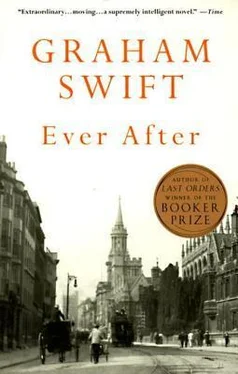10th June 1854:
We are all aware, though none of us announces the fact, that today would have been the second birthday of little Felix. One and a half months dead — as if such posthumous calendars were significant. We go to the graveside, though I truly believe poor Felix, if he could speak, would bid us not to mark the inaugural day of a life so wastefully short.
A blooming, midsummer’s day. Swallows swooping around the church tower. A day designed to banish dark thoughts. Yet the thought does not escape me that it is almost ten years ago to the day that I made my excursion to Lyme. How I knew nothing then of my darling Liz, of my John, Christopher, Lucy and poor Felix. And yet how neither the passage of ten years nor all the heaped contentments they have brought me can expunge from my memory that former incident. How different my present powers of patience, of humble submission to Providence, had I not taken that journey. God knows how much since then I have pretended. God knows! — but there, in a phrase, is the essence of my pretence.
How earnestly have I endeavoured to persuade myself that I was the victim of some circumstantial or atmospheric “effect.” Was not the tableau perfect? The darkening sky, the lightning flashes at sea, the flapping and straining of the tarpaulin pitched above the exposed skull. I recall every detail. The sudden cry of the young woman who had slipped on the wet surface further down the path, so that everyone rushed from the enclosure to attend the accident, leaving me alone with the creature.
Why did I not rush too? To assist the damsel in distress. A little common gallantry might have saved me.
Yet I know — ten years cannot undo the knowledge — that what followed was not a moment of unreasoned panic and confusion but a moment of acute perspicacity . Truly, I was to rush too, a little while after the others, from under the tarpaulin; to rush quite past the little group helping the young lady, who must have regarded me with astonishment. I recall a cluster of umbrellas bouncing in the wind; the pale face of the victim (victim!) supported by one of her party while she tried the strength of her ankle; mud on her garments. But of what little note to me was this touching scene of mere human misfortune.…
He saw an ichthyosaur. It is difficult to know how people will react when they see an ichthyosaur. I can understand it with Felix — though I have never had children. Yes, I can understand it with Felix (though, even then, such a man as Matthew, cognisant of the infant mortality rate of the times — they bred hard, these Victorians, and with reason — might have thought: not so terrible, one in four). But with an ichthyosaur? An ichthyosaur.
Quite probably, he had seen one before. (I too have seen ichthyosaurs, in museums, in books. I have made a point of it, in fairness to Matthew. I look at them and don’t feel that much at all.) If he had been to London, which he probably had, he would have seen in the British Museum the famous ichthyosaur, thirty feet long, discovered (first of its kind to be so unearthed) by Mary Anning of Lyme Regis — beside which awesome exhibit this half-buried specimen, perhaps some fifteen feet, was a mere baby.
Yet museums are safe, orderly, artificial places, and here, still trapped in the rock from which workers employed by the same Mary Anning were labouring to release it, within sight of the plump hills of Dorset and the ruffled waters of Lyme Bay, was the thing itself. Here, in the very spot where— Here. Now. Then. He stood face to face with the skull of a beast that must have lived, so certain theories would have held, unimaginably longer ago than even the most generous computations from the Scripture allowed for the beginning of the world (yet which must have been created, so something inside him would have insisted, by God); so long ago that the fact of its existence had been almost irretrievably swallowed up in the fact of its extinction and only now, in the pathetically locatable nineteenth century, had it come to be known that it had existed at all; and thought— And thought what?
“… The moment of my unbelief. The beginning of my make-belief.…”
You have to picture the scene. You have to imagine these scenes in which for most people nothing changes, nothing is essentially different — all this drama and fuss, a passing storm, a twisted ankle — but for some people the world falls apart. I think that’s perhaps what Ruth did — all this drama! To picture how the world might be — how it might fall apart or hold, incredibly, together — in the eyes of other people.
Such a simple, unconscionable thing: to be another person.
A flapping tarpaulin. Sticky gobs of rain, a bruised, galvanic sky. The long, toothed jaw; the massive eye that stares through millions of years. He is the creature; the creature is him. He feels something open up inside him, so that he is vaster and emptier than he ever imagined, and feels himself starting to fall, and fall, through himself. He lurches on to the path, as if outward movement will stop this inward falling. He passes a startled young woman, who has fallen also, but less than her own length and on to solid ground. He blunders down another path, not the path he came up by but a path which takes him to the beach — as if to stop himself falling he must get to sea level. The storm swipes in off the sea. His hat blows off; he is soaked. Everything is lost and confused — sea, rocks, cliffs, sand — in swamping greyness.
17th June 1854:
An impossibility, a contradiction: to pray for belief. He knows everything. He “unto whom all hearts be open.” He punishes me with Felix’s death, for perpetrating this impossibility. Or: for my false belief, the belief in my own pretence.
Or: Felix’s death: merely a proof.
18th June 1854:
No, I will not believe it. I will acknowledge the insoluble mathematics of nature, the wanton waste and the resourcefulness of her economy; that compared with the brief life of countless creatures, my Felix may be said to have lived an age; that everywhere, if seeds and eggs be counted, examples abound of gross destruction so that few may survive; that humankind, albeit leniently accommodated, is not excused from this scheme. But I cannot believe that in this prodigious arbitrariness there is any purpose that grants life to a child only to withdraw it after two years; that it is not the case, rather, that he might as well not have existed; that he holds, in truth, in the great course of things, no place, value or identity compatible with the vain fabric of loving recognition that I, that we all, have built around him.…
He walks and walks, to stop the falling, all the way back to Lyme. If Lyme is still there. It is — emerging from the curtains of rain. But how pathetic and pitiable it looks; the little huddle of habitation, the quaint tumble of roofs, the cluster of rocking boats cradled in the curving arm of the Cobb.
And it was meant to be a holiday. And now it has become an experience from which he must recover, slowly convalesce. Though no one can help or nurse him but himself. No one will even know how he is not himself, how far he has fallen through himself, except himself. And the only remedy he has is to pretend. To pretend so hard that one day, perhaps, he will forget he is pretending. He will do his best, and even achieve, quite soon, some outward approximation of recovery, so that, back in Launceston that same summer, even his own father will not guess the true extent of the damage. The lad is strangely out of sorts, to be sure. So much for the benefits of sea air. Some talk of an untimely ailment, a fever, a soaking in a summer storm. As like as not, some woman is at the bottom of it. At any rate, his son is oddly reluctant to discuss the whole Tavistock question. Well, well, let the cloud pass, give everything its time.
Читать дальше












